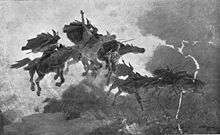Herja
In Norse mythology, Herja (Old Norse) is a valkyrie attested in the longer of the two Nafnaþulur lists found in the Prose Edda.[1]

"The Ride of the Valkyrs" (1909) by John Charles Dollman.
Rudolf Simek says the name is etymologically related to the Old Norse herja and Old High German herjón (meaning "devastate"), and derives from Proto-Germanic word *Herjaza. Simek notes that the Continental Germanic goddess name Hariasa (attested from a now lost 2nd century stone found in Cologne, Germany) also derives from *Herjaza, but says that "it is almost impossible to say whether Herja was an original name of a goddess including among the North Germanic peoples," and that "an independent development is equally likely in the case of a 'goddess of war'."[2]
Notes
- Jónsson (1973:678).
- Simek (2007:143). For Hariasa, Simek (2007:131).
gollark: It did break lots, sure, but unless TJ09 manages to have gone against all sanity advice regarding database use, `-` at the start should not be a problem.
gollark: If it did, TJ09 has done it utterly, *utterly* wrong.
gollark: Weird And Arbitrary Rules, #90062.
gollark: Must just be some weird prohibition against starting names with `-`.
gollark: I'm pretty sure it's *not*.
References
- Jónsson, Finnur (1973). Den Norsk-Islandske Skjaldedigtning. Rosenkilde og Bagger.
- Simek, Rudolf (2008). Dictionary of Northern Mythology. Ds Brewer. ISBN 978-0-85991-513-7.
This article is issued from Wikipedia. The text is licensed under Creative Commons - Attribution - Sharealike. Additional terms may apply for the media files.
.png)